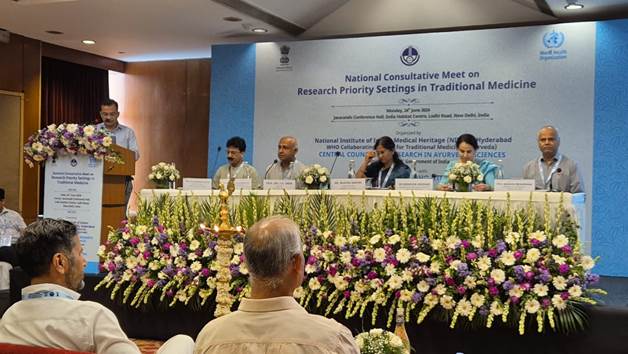New Delhi: In a landmark move aimed at aligning traditional medicine research with global standards and priorities, the Central Council for Research in Ayurvedic Sciences (CCRAS) has signed two significant Memoranda of Understanding (MoUs) with Krishna Ayush University, Kurukshetra, and Dabur, a leading Ayurvedic company in India. Alongside these partnerships, CCRAS also launched its newly updated website, marking a new era of digital engagement and resource availability.
The announcements were made during the National Consultative Meet on “Research Priority Settings in Traditional Medicine” held on June 24, 2024, at the India Habitat Center, New Delhi. The event was organized in collaboration with the WHO South-East Asia Regional Office (WHO-SEARO) and the WHO Global Traditional Medicine Centre (WHO-GTMC).
Vaidya Rajesh Kotecha, Secretary of the Ministry of Ayush, highlighted the initiative’s goal: “The objective is to ensure effective utilization of funds and address critical areas of need within traditional medicine, including medicinal plant research, quality, safety, and efficacy studies, pre-clinical validations, rational use of traditional medicines, clinical trial monitoring, medical anthropology, and the digitalization of ancient medical literature, thereby supporting its global acceptance and integration.”
Prof. (Vaidya) Rabinarayan Acharya, Director General of CCRAS, emphasized the strategic significance of the MoUs with Dabur and Shri Krishna Ayush University: “We wanted to chart a research roadmap for the next decade and lay the groundwork for a decade-long research strategy in traditional medicine, aligning our efforts with WHO guidelines. These MoUs mark a healthy start in this direction.”
Prof. Kartar Singh Dhiman, Vice Chancellor of Krishna Ayush University, underscored the importance of the MoU: “Under its ambit, both parties will foster academic and research collaborations, providing opportunities for researchers and scientists to exchange ideas through workshops, seminars, and PhD studies.”
The consultative meet brought together representatives from diverse domains of Traditional Medicine (TM) in India, including policymakers, academic institutions, researchers, patients, and industry stakeholders. The aim was to identify and prioritize key research areas across various traditional medicine systems such as Ayurveda, Siddha, Unani, and Homeopathy.
Setting research priorities is critical for guiding resource allocation, shaping scientific agendas, and influencing innovation and discovery. As the demand for traditional medicine grows globally, the need to set these priorities becomes more urgent. The identified areas will shape the roadmap for policies in traditional medicine at both regional and global levels.
The event saw the participation of around 150 stakeholders, including representatives from the Ministry of Ayush, NITI Aayog, heads of research councils from different streams of traditional medicine and homeopathy in India, vice-chancellors of various reputed universities, directors of national institutes under the Ministry of Ayush, ICMR-NITM, CSIR, RIS-FITM, JNU New Delhi, WHO-SEARO, WHO-GTMC, policymakers, pharmacy representatives, and media persons.
Round table discussions among expert working groups shaped the prioritization exercise, which was followed by a plenary session to discuss the way forward. Dr. G.P. Prasad, Assistant Director (In-charge) of the National Institute of Indian Medical Heritage (NIIMH) and a co-organizer of the event, highlighted the importance of prioritization in preserving and documenting traditional knowledge, protecting cultural heritage, and biodiversity associated with medicinal plants and indigenous healing practices.





